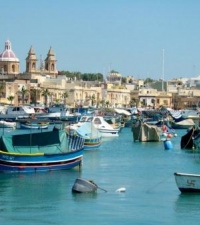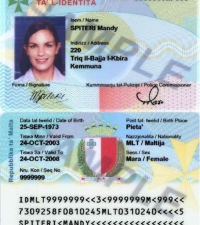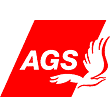A Visa for Malta

Overview
- Malta is a Schengen Member State and EU/EEA nationals do not require a visa to enter Malta
- Non-EU/EEA nationals require a visa to enter Malta (visas are valid for a maximum of 90 days)
- Non-EU/EEA nationals cannot stay in Malta longer than 90 days in any 180 day period
- Upon entry to Malta, non-EU/EEA nationals who wish to stay in Malta for 90 days must apply for a residence permit
Visas
Malta is part of the Schengen system, giving total freedom of movement to Schengen Member State nationals and members of their family to/from Malta. Other foreign nationals must present a valid passport for entry to Malta, and may be required to obtain a visa.
Visas are authorizations, in the form of a sticker issued and affixed to a passport by a diplomatic mission (Embassy or Consulate) to a third-country national (non EU/EEA national). Visas authorize the bearer to stay or travel through Malta during a limited, specified period.
Foreign nationals from most EU/EEA countries, the USA, and Commonwealth countries do not require a visa to enter Malta for stays of less than 90 days. You should verify with the nearest Maltese Embassy or Consulate whether you require a visa to enter Malta, and the specific visa requirements for your country.
You can also find a list of countries which require visas for entry to Malta here.
Visas are valid for 90 days, after which non-EU/EEA foreign nationals must apply for a uniform residence permit, and EU/EEA nationals must register their presence in Malta.
Non-EU/EEA nationals, or third country nationals (TCN’s), cannot stay in Malta on a 90-day visa more than 90 days (3 months) of any 180-day period (6 month).
TCN visitors to Malta must also be in possession of documents substantiating the purpose of their stay in Malta and have sufficient means of support for their stay and return transit to their country of origin. TCN’s in possession of a residence permit from a Schengen Member State are exempt from this set of requirements.
Travel to multiple Schengen Member States/Malta
Visa applications for entry to Schengen Member States must be filed at the diplomatic mission of the country that is the main destination of your visit. If you intend visit several Schengen states with stays of approximately the same duration, you must file your visa application for the first Schengen Member State you will be visiting.
Therefore, if Malta is your main destination, or the country of first entry into the Schengen area, you must file your applications at Malta’s diplomatic missions or its representations.
Types of Visas
Most TCN expats or visitors to Malta who require a visa will apply for a Schengen Type D Long Term/National Visa, or a Schengen Type C Short-Stay Visa.
Temporary visitors may also apply for Airport Transit Visas (Type A).
You can only apply for Type C visas in countries where Malta has no diplomatic post. Type C visas are valid for 90 days, and applicants must apply for temporary residence permits once in Malta to extend their stay. Applicants must first obtain a Type C visa, if required to enter Malta, before applying for a residence permit.
You can apply for a Type D visa at Malta’s diplomatic missions or consular posts. Type D visas are valid for the duration of your stay in Malta (longer than 90 days, with one or multiple entries). Applicants must first obtain a Type D visa, if required to enter Malta, before applying for a residence permit.
Applying for a Visa
You can apply for a visa at your local Maltese Embassy or Consulate.
To find out where to apply for a visa in your country of origin, visit the Ministry of Foreign Affairs web site.
All embassies and consulates will require documentation when you apply for a Type D or Type C visa. This documentation may vary from embassy to embassy, therefore it is highly recommended you verify with your country’s embassy or consulate as to their specific requirements. General documentation requirements include:
- The application form (download here)
- Passport valid for more than three months (90 days)
- Two passport sized photographs (European sized, in colour, taken against a white background, with face clearly visible)
- An application fee. For Type D, Type C and Type A visas the application fee is €60, payable at the Maltese Embassy or Consulate in your country.
- Documents indicating the purpose of your visit (a certificate of school enrolment, a summons, a letter of invitation, an organized trip)
- Documents indicating means of transport and return (a valid return ticket, a certificate of a reserved or prepaid journey, etc.)
- Proof of financial means to support you up to €48/day for the duration of your stay (cash, traveller’s cheques, cheque books for a foreign currency account, credit cards, etc.)
- Documents indicating proof of accommodation (hotel reservation, lease or letting agreement, written declaration by your host, etc.)
- Proof of health insurance for the duration of your stay, which covers repatriation and emergency medical attention, with a minimum coverage of €30,000.
You may also be required to undergo an interview, in person, at your country’s Maltese Embassy or Consulate.
For a list of other required documentation for specific purposes of stay (business, studies, tourism) visit the Ministry of Foreign Affairs web site.
By Jess Gerrow, who traded city life in Canada for island life in the Mediterranean two years ago. She is a postgraduate marketing student, blogger, and freelance writer.
- My Life Abroad -
A selection of expat stories

"A fun compulsive read!"
J. Matcham, Amazon
"I strongly advise people ready to live abroad to read this book!"
Patrice, Amazon

 Embassies and Consulates in Malta
Embassies and Consulates in Malta  Getting an ID Card
Getting an ID Card Residence Permits: Non EU or Third Country Nationals
Residence Permits: Non EU or Third Country Nationals
 AGS Worldwide Movers
AGS Worldwide Movers Fexco payment solutions
Fexco payment solutions 1stMove Car Shipping
1stMove Car Shipping